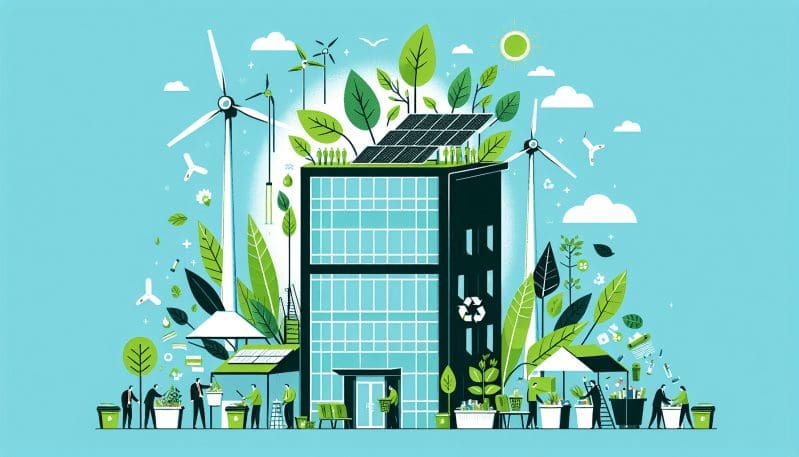In the heart of the concrete jungle, New York-based companies are rising to the challenge of the climate crisis. Much like The New York Times sheds light on pivotal issues through critical analysis, The Work Times takes a magnifying glass to the corporate warriors pioneering revolutionary initiatives against climate change. At the crossroads of economic drive and environmental stewardship, these workplaces serve as battlefields for sustainability, where every policy and practice can tilt the scales in our ongoing fight for a greener tomorrow.
One of the luminaries in this endeavor is the skyscraper that has embedded sustainability into its steel bones—The EcoTower. The tower is not just a feat of architectural brilliance but also a symbol of renewable energy adoption as its roof and walls are clad with solar panels that power the entire building, making it a net-zero energy marvel. Moreover, motion-sensor LEDs illuminate its corridors, ensuring energy is not wasted on empty spaces.
Then there’s the Zero-Waste Pioneer, a tech giant whose commitment to eliminating waste from its operations has birthed an innovative, circular economy within its walls. Its comprehensive recycling programs have diminished landfill contributions by an astonishing 90%, while the company cafeteria exclusively sources its food from local, sustainable farms, cutting down on carbon emissions associated with transportation.
Not to be overshadowed, the Green Infrastructure Investor is redesigning the urban environment. From green rooftops that provide insulation and reduce run-off to cutting-edge water reclamation systems, this stalwart’s investment in green infrastructure extends beyond the workplace, revitalizing the surrounding community and mitigating the urban heat island effect.
The effectiveness of these and countless other initiatives is heartening, providing a blueprint for other companies eager to follow suit. Beyond the immediate environmental impacts—reduced emissions, conservation of resources, and biodiversity preservation—these efforts demonstrate a key narrative: sustainability is not antithetical to profitability. On the contrary, it’s the future of business innovation and resilience.
Economic advantages of such climate action initiatives are manifold. Companies are noticing decreased operational costs through energy savings, garnering tax benefits from green investments, and receiving heightened brand loyalty from consumers who value corporate responsibility. Moreover, employees are increasingly seeking to work for organizations that reflect their values, making sustainability a strategic advantage in talent acquisition and retention.
As stewards of the environment and architects of the future, these workplaces are not just participating in a societal shift towards sustainability—they are leading it. They embody the principle that with the right mix of innovation, commitment, and collaboration, the journey towards a sustainable future can be both environmentally beneficial and economically viable.
The Work Times invites you to join the discussion: how can your workplace become a champion of the environment? Share this narrative within your networks, and let’s foster a community where sustainability and profitability are synonymous, where every workday is an opportunity to make a difference in the climate action crusade. Together, we can turn today’s workplaces into the success stories of tomorrow’s greener world.




























